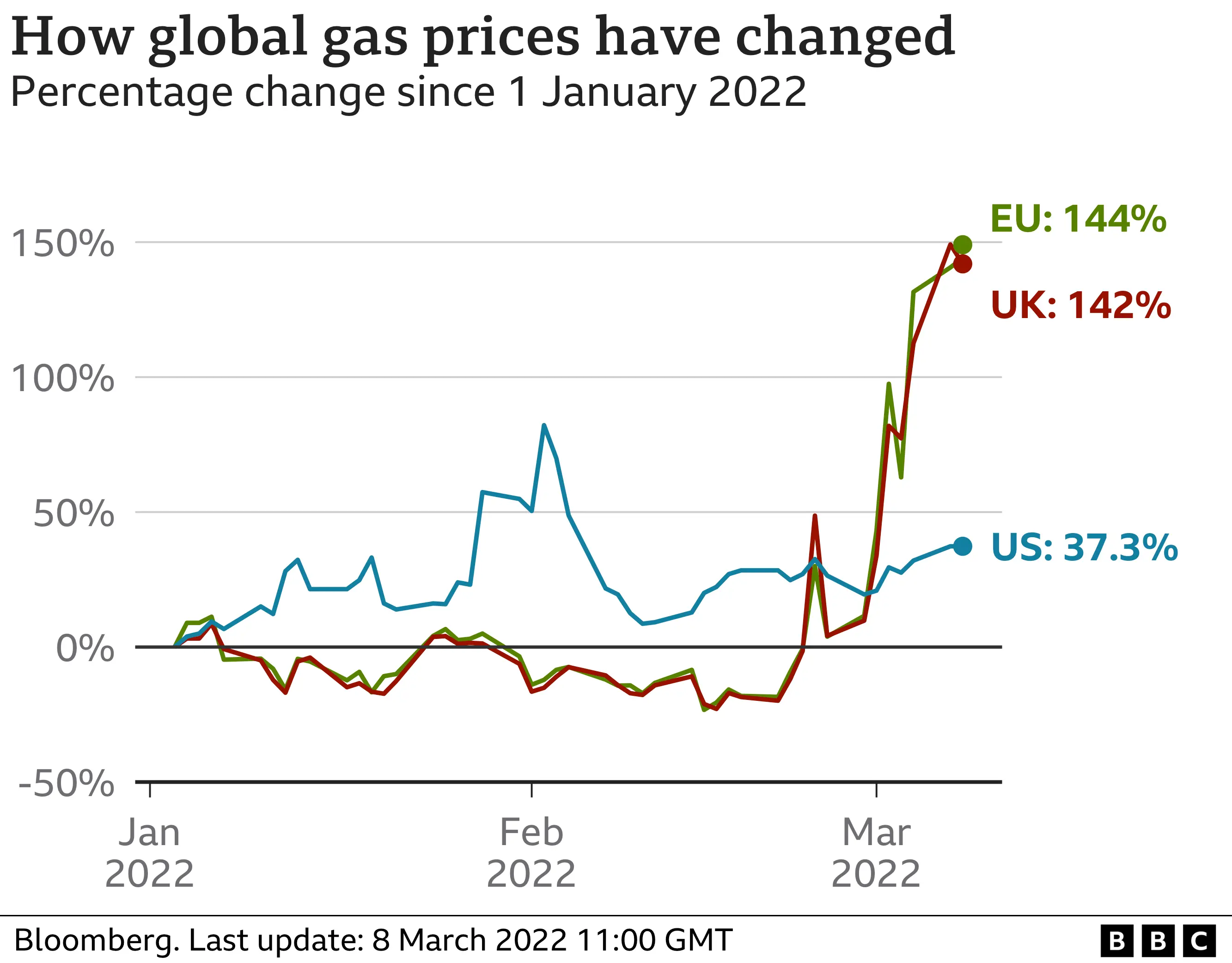War in Ukraine: West hits Russia with oil bans and gas curbs
The US and UK are banning Russian oil and the EU is ending its reliance on Russian gas, stepping up the economic response to the invasion of Ukraine.
US President Joe Biden said the move targeted "the main artery of Russia's economy".
Energy exports are a vital source of revenue for Russia but the move is also likely to impact Western consumers.
Major brands have meanwhile continued to pull out of Russia, with McDonald's and Coca-Cola the latest to leave.
Russia's economy is heavily dependent on energy. It is the world's third-biggest oil producer, behind Saudi Arabia and the US.
Before the measures were announced, Russia warned of "catastrophic" consequences for the global economy and said it might close its main gas pipeline to Germany.
On the ground in Ukraine, civilians have been evacuated from two under-attack areas while the US has said up to 4,000 Russian troops may have been killed in the conflict.
The conflict has already sent petrol prices to record highs in the US and the UK and experts warn they could go even higher.
However, Venezuela could increase its oil production to help replace Russian oil.
Reinaldo Quintero, president of the association that represents Venezuelan oil companies told the BBC that the country could potentially raise its production levels by 400,000 barrels a day.
"I think we can reach 1.2 million barrels per day with the infrastructure we have right now at this moment. So that will make us able to supply the need, some of the need, to the North American market," he said.
Russian oil 'no longer acceptable'
President Biden's announcement followed pressure from both sides of the US political divide to do more to target the Russian economy.
"We're banning all imports of Russian oil and gas and energy," he said.
"That means Russian oil will no longer be acceptable at US ports and the American people will deal another powerful blow to [President Vladimir] Putin."
Mr Biden admitted the move was "not without cost at home," adding the decision was taken "in close consultation" with allies.
In a similar move, the UK is to phase out Russian oil imports by the end of 2022.
The UK Prime Minister, Boris Johnson, accepted that the move would not hit Russia immediately but added "what it will do is add to the pressure we're already seeing on Russia and don't forget that the economic impact of the sanctions that the UK has led has been extreme".
About 8% of US oil and refined product imports come from Russia, while Russia makes up about 6% of the UK's oil imports.
By contrast, the EU is much more reliant on Russian energy, so the bloc's response stopped short of a ban.
The European Commission said it would switch to alternative supplies and expand clean energy faster to fill the shortfall, with the aim of making Europe independent from Russian fossil fuels "well before 2030".
"We're not standing here to say this is going to be in any way easy," said the European Commission's Vice-President Frans Timmermans.
"But I am also deeply convinced that even if it's not easy, even if it's very hard, it's something we need to do, because now it's also intimately linked to our security."
Russia later announced plans to ban the exports of certain commodities and raw materials. The details are still to be worked out, but Russia is a major exporter of grain and metals.
Even countries with low Russian energy imports are set to feel the impact as the measures are likely to boost already high wholesale prices. Inflation is soaring in the US, EU and the UK, adding to the pressure on households.
The move adds to a long list of economic sanctions imposed against Russia following its invasion of Ukraine - the central bank has had its assets frozen, some Russian banks have been cut off from global payment networks and Germany suspended the Nord Stream 2 pipeline, which would have transported more gas from Russia to Germany.
But energy sales have continued to provide a source of cash despite the other financial restrictions.

